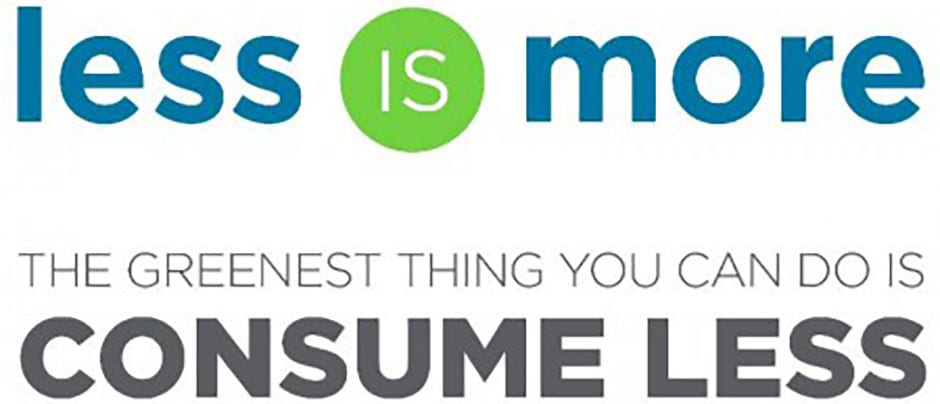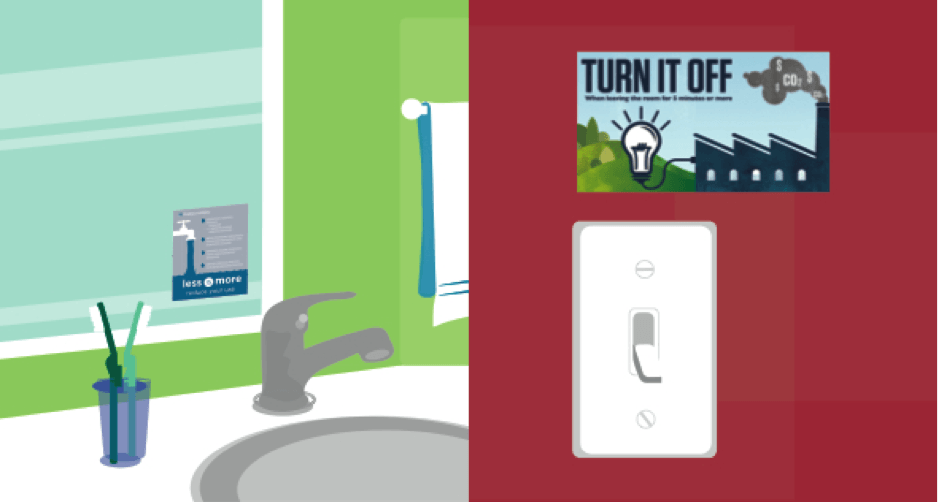Students, faculty, and staff at Washington University in St. Louis commit to consuming less through the “Less Is More” campaign.
 “Less Is More” encourages every member of the WashU community to take personal steps to lower the university’s emissions, preserve natural resources, improve air quality and public health, and protect the environment for ourselves and future generations. Join us by taking simple actions that result in big change:
“Less Is More” encourages every member of the WashU community to take personal steps to lower the university’s emissions, preserve natural resources, improve air quality and public health, and protect the environment for ourselves and future generations. Join us by taking simple actions that result in big change:
- Turn off lights if the space you are leaving won’t be occupied for five or more minutes.
- Take shorter showers.
- Set your computer and cell phone to power-save mode.
- Buy fewer disposable products.
- Recycle everything possible.
- Use reusable water bottles, bags, to-go boxes, and coffee mugs.
- Walk, bike, or take mass transit instead of traveling in a single-occupant vehicle.
Less Is More Toolkit

The Office of Sustainability provides a toolkit designed to remind us of simple, everyday actions we can take to reduce our impact on the environment. The toolkit, part of the Washington University in St. Louis “Less is More” campaign, addresses the concept of “the greenest thing you can do is consume less.” The toolkit encourages simple actions with big impact. The toolkit contains stickers for thermostats with suggested eco-friendly settings, fridge magnets reminding of phantom loads, a recycling information poster, an info card on energy saving settings for laptops and mobile devices, stickers for the restroom with water saving tips, and light switch stickers reminding users to turn the lights off when leaving the room. The items in the kit are designed to be practical and fun while establishing a direct link between our consumption and the source of the materials we consume. For example, the light switch sticker reminds users that every time we turn on a light, we are burning coal. Look for the kit available across campus, or drop by the Office of Sustainability to pick up your own.
Reducing Your Impact
By changing simple habits in everyday life, we can have a big impact on the environment and substantially reduce our carbon footprint.
Every time you turn on the lights, you’re using energy and increasing your environmental impact. In Missouri, approximately 76 percent of electricity comes from coal combustion, which adds significant amounts of greenhouse gases to the atmosphere. Lighting uses a huge amount of energy, accounting for roughly 33 percent of a building’s energy usage. When you choose to leave a room with the light on, you’re contributing to the estimated $500,000 the university spends annually on lighting unoccupied spaces.
To use less and save more:
- Turn off the lights when you leave your room, office, bathroom or meeting room for more than five minutes.
- Utilize daylight as much as possible.
- Swap out your incandescent bulbs for LEDs or compact florescent bulbs (CFLs).
Plug-in products are a leading source of energy consumption in our dorms, labs, libraries, and offices. Once plugged in, most products will consume energy even when they are not in use. These “phantom loads” waste energy and contribute to your greenhouse gas footprint. To reduce our impact as a community, we must work together to minimize our unnecessary electricity use.
To reduce your electrical usage:
- Identify nonessential or duplicate electronics in your life and stop using them.
- Adjust power settings on your computer: reduce your screen brightness, set the monitor to dim after two minutes and turn off after five minutes, and set the computer to sleep after 15 minutes.
- Adjust power settings for your cell phone: reduce your screen brightness, turn on Wi-Fi, GPS and Bluetooth only when needed.
- Turn off devices, switch off power strips, and unplug chargers when not in use.
Fresh water is a precious resource – we need water to grow our food, to drink, and to survive. Of earth’s water, only 0.27 percent is available for human use. Every time you turn on the faucet, take a shower, use the toilet or wash your clothes, you’re using water, draining resources, and increasing your greenhouse gas footprint.
To reduce your water consumption:
- Take shorter showers; try limiting yours to five or fewer minutes.
- Turn off the faucet when you’re not using the water, such as while brushing your teeth, shaving or doing other bathroom activities.
- Install low-flow shower heads in your home or apartment. Use a reusable water bottle instead of bottled water. Set the washing machine to use cold water.
Heating and air conditioning takes up the largest fraction of the university’s energy consumption. When setting your thermostat, you decide what sort of energy consumer you will be. To reduce your consumption, you can shift your environment naturally with the seasons, using external temperatures as a base for determining the temperature of your dorm, office, classroom, lab, or apartment.
To save energy and be comfortable year-round:
- Dress appropriately for the season.
- During cold months (Nov.-March), set your thermostat between 67-70 degrees.
- During warm months (April-Oct.), ask the facilities department how to optimize your building’s performance. (For dorms, set your thermostat between 73-76 degrees. Classrooms, offices, patient care, and labs should contact the facilities department.)
- Do not use space heaters. Contact the facilities department if your space is too cold.
The average American produces an average of 4.5 pounds of garbage per day. While Americans only represent five percent of the earth’s population, we produce 30 percent of human waste. If the rest of the world consumed like we do, we would need five worlds to support those consumption habits. When you put something in the trash, it remains in the landfill for years, releasing greenhouse gases and polluting groundwater.
To reduce your waste: When in doubt, recycle:
- The majority of waste generated on campus is recyclable. Landfill as little as possible: Only send plastic bags, wrappers, liquid, Styrofoam, food, and ice to the landfill.
- Compost where available: Food, ice, to-go boxes, napkins, and liquids can all be composted.
- Donate unwanted items: You can donate to the Trading Post year-round and Share Our Stuff at the end of spring.
Properly dispose of broken or unwanted electronics. (Staff: fill out the Environmental Health & Safety form to schedule a free waste pick-up. Students, please recycle broken electronics, appliances, batteries, lamps, and any kind of cable at Student Technology Services.)